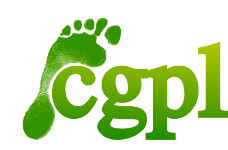
About
CGPL is an open source copyright (copyleft) license that has been designed to specifically address issues concerning digital materialization and fabrication. Physical objects and information are becoming increasingly interchangeable and this is creating unprecedented individual and societal control over our relationships with nature and our world. CGPL has been created to guide related technologies and knowledge in a productive, human-centered direction by combining the ethos of open source and universally accepted ethical standards.
Oh No, Not Another One
Q: There are currently many free and open source licenses so why make another one? How is this license different than the others?
A: None of the free and open licenses that currently exist address issues that we found ourselves having to deal with. This license grew out of a practical, real-world need, not just idealistic dogma. The fundamental difference from other licenses is the addition of creative responsibility and accountability for the entire life of an object, piece of work or information. We have done this by adding human and environmental rights to the general principles of fair sharing.
You Must Be Nuts
Q:What was the the motivation for this license?
A: The groups involved with CGPL work on an open standard for N-dimensional modeling and simulation software and hardware technology. This technology, or technology very similar, will be the underlying foundations for personal digital fabrication and complex multi-physics simulation. In short, the personalized creation of synthetic objects and environments. This technology affords large amounts of power to individuals, that has the potential to be used constructively or destructively.
As we looked into releasing the software under free and open standards, it was clear there was a choice: to release it with no creative responsibility/accountability or require some kind of "fair play" (not dissimilar to current free and open concept of fair sharing). To our surprise, we found no such existing license so we created our own.
Free Speech Or Free Beer
Q:Is this really a free and/or open source license?
A: Yes and maybe no. Free and open source have many definitions. In digital technology, they are commonly defined by The Free Software Definition and the Open Source Definition and they do not mean the same thing. If free is meant as in the general definition of freedom or the sharing of technology and open community building, then yes, we believe it to be very free. If free is meant, as defined by FSF's The Free Software Definition, then no, it may not "Free" or at the least not GPL compatible.
Regarding open source, by all definitions of the term, including the Open Source Definition, we believe that this license is indeed open source. In fact, we intend the license to play well (link with) with all Free Software, Open Source and other such licenses.
You Are Wrapping Me Up In Red Tape
Q:There are laws in society that takes care of human and environmental rights, why put them in a license?
A: Many of the current legal structures are horribly inadequate to deal with powerful digital technology. CGPL is a copyright and copyright law is one of the few internationally recognized legal structures. Putting these kinds of requests in the license itself creates a starting point for accountability and a common culture for all individuals and organizations that become involved with technology licensed under CGPL. Even if local social laws are adequate, getting people to actively agree at the beginning rather than having them passively capitulate with their society is a more successful and positive approach. It helps to foster a culture of creative responsibility.
In addition, as culture, societies and corporations become less bound by national boundaries, new organizations and laws will occur more and more in virtual networked environments. We can already see the power that virtual organizations, copyright and contract law have on societies in this boundless environment.
I Am Going To Hell And You Are Not
Q:Ethics and morality are a very personal choice. How can you dictate them in a license?
A: This is only ethics at a very abstracted, generalized and cross-cultural level. There is no dictatorship, if you disagree, you can simply not use the license.
It is also in humankind's best interest. It is possible that current digital and creative freedom will not continue to exist and be taken from us, unless we have some kind of self regulation and accountability.
I Have Heard About This Cult
Q:How and why did you choose the Declaration of Human Rights from the United Nations for the basis of human rights? Why did you choose the Natural Step environmental provisions of this license?
A: The UN and the Natural Step are two organizations which seem to have the best notoriety and standards for their given fields.
It's Shiny But Does It Work
Q:Is this too idealistic?
A: No, we see this license as a very pragmatic long term solution for fostering a strong community and the ethics necessary for dealing with the increasingly powerful tools and technologies that individuals and society will come in contact with. Setting standards and norms for new technological and societal shifts is a typical and necessary process. We hope to facilitate this process at an early stage in the best possible way.